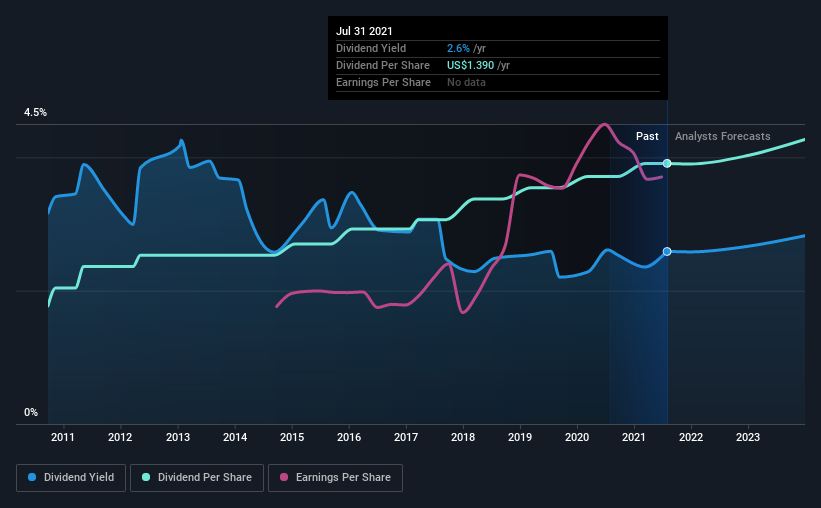Be Sure To Check Out Intel Corporation (NASDAQ:INTC) Before It Goes Ex-Dividend
Readers hoping to buy Intel Corporation (NASDAQ:INTC) for its dividend will need to make their move shortly, as the stock is about to trade ex-dividend. The ex-dividend date occurs one day before the record date which is the day on which shareholders need to be on the company's books in order to receive a dividend. It is important to be aware of the ex-dividend date because any trade on the stock needs to have been settled on or before the record date. Therefore, if you purchase Intel's shares on or after the 5th of August, you won't be eligible to receive the dividend, when it is paid on the 1st of September.
The company's upcoming dividend is US$0.35 a share, following on from the last 12 months, when the company distributed a total of US$1.39 per share to shareholders. Based on the last year's worth of payments, Intel stock has a trailing yield of around 2.6% on the current share price of $53.72. Dividends are an important source of income to many shareholders, but the health of the business is crucial to maintaining those dividends. So we need to investigate whether Intel can afford its dividend, and if the dividend could grow.
View our latest analysis for Intel
Dividends are typically paid out of company income, so if a company pays out more than it earned, its dividend is usually at a higher risk of being cut. Fortunately Intel's payout ratio is modest, at just 30% of profit. A useful secondary check can be to evaluate whether Intel generated enough free cash flow to afford its dividend. Fortunately, it paid out only 34% of its free cash flow in the past year.
It's encouraging to see that the dividend is covered by both profit and cash flow. This generally suggests the dividend is sustainable, as long as earnings don't drop precipitously.
Click here to see the company's payout ratio, plus analyst estimates of its future dividends.
Have Earnings And Dividends Been Growing?
Stocks in companies that generate sustainable earnings growth often make the best dividend prospects, as it is easier to lift the dividend when earnings are rising. Investors love dividends, so if earnings fall and the dividend is reduced, expect a stock to be sold off heavily at the same time. Fortunately for readers, Intel's earnings per share have been growing at 13% a year for the past five years. Earnings per share are growing rapidly and the company is keeping more than half of its earnings within the business; an attractive combination which could suggest the company is focused on reinvesting to grow earnings further. Fast-growing businesses that are reinvesting heavily are enticing from a dividend perspective, especially since they can often increase the payout ratio later.
The main way most investors will assess a company's dividend prospects is by checking the historical rate of dividend growth. Since the start of our data, 10 years ago, Intel has lifted its dividend by approximately 8.2% a year on average. It's encouraging to see the company lifting dividends while earnings are growing, suggesting at least some corporate interest in rewarding shareholders.
Final Takeaway
Has Intel got what it takes to maintain its dividend payments? Intel has been growing earnings at a rapid rate, and has a conservatively low payout ratio, implying that it is reinvesting heavily in its business; a sterling combination. It's a promising combination that should mark this company worthy of closer attention.
While it's tempting to invest in Intel for the dividends alone, you should always be mindful of the risks involved. Be aware that Intel is showing 2 warning signs in our investment analysis, and 1 of those is potentially serious...
A common investment mistake is buying the first interesting stock you see. Here you can find a list of promising dividend stocks with a greater than 2% yield and an upcoming dividend.
This article by Simply Wall St is general in nature. It does not constitute a recommendation to buy or sell any stock, and does not take account of your objectives, or your financial situation. We aim to bring you long-term focused analysis driven by fundamental data. Note that our analysis may not factor in the latest price-sensitive company announcements or qualitative material. Simply Wall St has no position in any stocks mentioned.
Have feedback on this article? Concerned about the content? Get in touch with us directly. Alternatively, email editorial-team (at) simplywallst.com.

